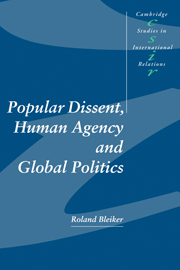Book contents
- Frontmatter
- Contents
- Acknowledgements
- Prologue: Theorising transversal dissent
- Introduction: Writing human agency after the death of God
- Part I A genealogy of popular dissent
- Part II Reading and rereading transversal struggles
- 4 From essentialist to discursive conception of power
- First interlude: Confronting incommensurability
- 5 Of ‘men’, ‘women’ and discursive domination
- 6 Of great events and what makes them great
- Part III Discursive terrains of dissent
- Conclusion: The transitional contingencies of transversal politics
- Index
- CAMBRIDGE STUDIES IN INTERNATIONAL RELATIONS
First interlude: Confronting incommensurability
Published online by Cambridge University Press: 23 October 2009
- Frontmatter
- Contents
- Acknowledgements
- Prologue: Theorising transversal dissent
- Introduction: Writing human agency after the death of God
- Part I A genealogy of popular dissent
- Part II Reading and rereading transversal struggles
- 4 From essentialist to discursive conception of power
- First interlude: Confronting incommensurability
- 5 Of ‘men’, ‘women’ and discursive domination
- 6 Of great events and what makes them great
- Part III Discursive terrains of dissent
- Conclusion: The transitional contingencies of transversal politics
- Index
- CAMBRIDGE STUDIES IN INTERNATIONAL RELATIONS
Summary
[The problem] is precisely this gesture of totalized reasoning, which subsumes, or pretends to be able to subsume, everything into one concept, one theory, one position. The resulting philosophical ‘master discourse’ then turns into an intellectual domination by the Same, the One – a form of domination in which there is no room for the views of the Other, the Heterogeneous.
Before embarking on more rereadings of the transversal dynamics that led to the collapse of the Berlin Wall it is necessary to pause for a moment and reflect upon some of the central theoretical dilemmas that have arisen with a rethinking of human agency in global politics. What precisely is entailed in accepting the death of God? What does it mean to take over, rather than deflect responsibility? If one abandons the desire to understand the world in its totality, how can one deal with the ensuing proliferation of diverse and often incommensurable positions? Can we still articulate dissent, can we assert any kind of normative claim, without relying on stable foundations? Can we retain hope for articulating a viable but non-essentialist concept of human agency? And how can Foucauldian notions of power and discourse possibly offer help? Are they not, as some suggest, merely faddish concepts, destined to wax and wane with fleeting intellectual trends of the postmodern and poststructural kind?
This Interlude grapples with some of these dilemmas by engaging the literature on postmodernism.
- Type
- Chapter
- Information
- Popular Dissent, Human Agency and Global Politics , pp. 139 - 145Publisher: Cambridge University PressPrint publication year: 2000

